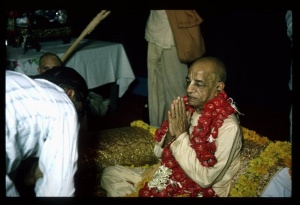SB 3.21.3: Difference between revisions
m (1 revision(s)) |
(Vanibot #0054 edit - transform synonyms into clickable links, which search similar occurrences) |
||
| (One intermediate revision by one other user not shown) | |||
| Line 1: | Line 1: | ||
{{info | {{info | ||
|speaker= | |speaker=Vidura | ||
|listener= | |listener=Maitreya Ṛṣi | ||
}} | }} | ||
[[Category:Srimad-Bhagavatam - Canto 03 Chapter 21|S03]] | |||
[[Category:Bhagavatam Verses Spoken by Vidura - Vanisource|032103]] | |||
<div style="float:left">'''[[Srimad-Bhagavatam]] - [[SB 3|Third Canto]] - [[SB 3.21: Conversation Between Manu and Kardama|Chapter 21: Conversation Between Manu and Kardama]]'''</div> | |||
<div style="float:right">[[File:Go-previous.png|link=SB 3.21.2]] '''[[SB 3.21.2]] - [[SB 3.21.4]]''' [[File:Go-next.png|link=SB 3.21.4]]</div> | |||
{{RandomImage}} | |||
==== TEXT 3 ==== | ==== TEXT 3 ==== | ||
<div | <div class="verse"> | ||
tasya vai duhitā brahman | :tasya vai duhitā brahman | ||
devahūtīti viśrutā | :devahūtīti viśrutā | ||
patnī prajāpater uktā | :patnī prajāpater uktā | ||
kardamasya tvayānagha | :kardamasya tvayānagha | ||
</div> | </div> | ||
| Line 16: | Line 22: | ||
==== SYNONYMS ==== | ==== SYNONYMS ==== | ||
<div | <div class="synonyms"> | ||
''[//vanipedia.org/wiki/Special:VaniSearch?s=tasya&tab=syno_o&ds=1 tasya]'' — of that Manu; ''[//vanipedia.org/wiki/Special:VaniSearch?s=vai&tab=syno_o&ds=1 vai]'' — indeed; ''[//vanipedia.org/wiki/Special:VaniSearch?s=duhitā&tab=syno_o&ds=1 duhitā]'' — the daughter; ''[//vanipedia.org/wiki/Special:VaniSearch?s=brahman&tab=syno_o&ds=1 brahman]'' — O holy ''brāhmaṇa''; ''[//vanipedia.org/wiki/Special:VaniSearch?s=devahūti&tab=syno_o&ds=1 devahūti]'' — named Devahūti; ''[//vanipedia.org/wiki/Special:VaniSearch?s=iti&tab=syno_o&ds=1 iti]'' — thus; ''[//vanipedia.org/wiki/Special:VaniSearch?s=viśrutā&tab=syno_o&ds=1 viśrutā]'' — was known; ''[//vanipedia.org/wiki/Special:VaniSearch?s=patnī&tab=syno_o&ds=1 patnī]'' — wife; ''[//vanipedia.org/wiki/Special:VaniSearch?s=prajāpateḥ&tab=syno_o&ds=1 prajāpateḥ]'' — of the lord of created beings; ''[//vanipedia.org/wiki/Special:VaniSearch?s=uktā&tab=syno_o&ds=1 uktā]'' — has been spoken of; ''[//vanipedia.org/wiki/Special:VaniSearch?s=kardamasya&tab=syno_o&ds=1 kardamasya]'' — of Kardama Muni; ''[//vanipedia.org/wiki/Special:VaniSearch?s=tvayā&tab=syno_o&ds=1 tvayā]'' — by you; ''[//vanipedia.org/wiki/Special:VaniSearch?s=anagha&tab=syno_o&ds=1 anagha]'' — O sinless one. | |||
</div> | </div> | ||
| Line 23: | Line 29: | ||
==== TRANSLATION ==== | ==== TRANSLATION ==== | ||
<div | <div class="translation"> | ||
O holy brāhmaṇa, O sinless one, you have spoken of his daughter, known by the name Devahūti, as the wife of the sage Kardama, the lord of created beings. | O holy brāhmaṇa, O sinless one, you have spoken of his daughter, known by the name Devahūti, as the wife of the sage Kardama, the lord of created beings. | ||
</div> | </div> | ||
| Line 30: | Line 36: | ||
==== PURPORT ==== | ==== PURPORT ==== | ||
<div | <div class="purport"> | ||
Here we are speaking of Svāyambhuva Manu, but in Bhagavad-gītā we hear about Vaivasvata Manu. The present age belongs to the Vaivasvata Manu. Svāyambhuva Manu was previously ruling, and his history begins from the Varāha age, or the millennium when the Lord appeared as the boar. There are fourteen Manus in one day of the life of Brahmā, and in the life of each Manu there are particular incidents. The Vaivasvata Manu of Bhagavad-gītā is different from Svāyambhuva Manu. | Here we are speaking of Svāyambhuva Manu, but in [[Bhagavad-gita As It Is (1972)|''Bhagavad-gītā'']] we hear about Vaivasvata Manu. The present age belongs to the Vaivasvata Manu. Svāyambhuva Manu was previously ruling, and his history begins from the Varāha age, or the millennium when the Lord appeared as the boar. There are fourteen Manus in one day of the life of Brahmā, and in the life of each Manu there are particular incidents. The Vaivasvata Manu of [[Bhagavad-gita As It Is (1972)|''Bhagavad-gītā'']] is different from Svāyambhuva Manu. | ||
</div> | </div> | ||
__NOTOC__ | |||
<div style="float:right; clear:both;">[[File:Go-previous.png|link=SB 3.21.2]] '''[[SB 3.21.2]] - [[SB 3.21.4]]''' [[File:Go-next.png|link=SB 3.21.4]]</div> | |||
__NOTOC__ | |||
__NOEDITSECTION__ | |||
Latest revision as of 21:41, 17 February 2024

A.C. Bhaktivedanta Swami Prabhupada
TEXT 3
- tasya vai duhitā brahman
- devahūtīti viśrutā
- patnī prajāpater uktā
- kardamasya tvayānagha
SYNONYMS
tasya — of that Manu; vai — indeed; duhitā — the daughter; brahman — O holy brāhmaṇa; devahūti — named Devahūti; iti — thus; viśrutā — was known; patnī — wife; prajāpateḥ — of the lord of created beings; uktā — has been spoken of; kardamasya — of Kardama Muni; tvayā — by you; anagha — O sinless one.
TRANSLATION
O holy brāhmaṇa, O sinless one, you have spoken of his daughter, known by the name Devahūti, as the wife of the sage Kardama, the lord of created beings.
PURPORT
Here we are speaking of Svāyambhuva Manu, but in Bhagavad-gītā we hear about Vaivasvata Manu. The present age belongs to the Vaivasvata Manu. Svāyambhuva Manu was previously ruling, and his history begins from the Varāha age, or the millennium when the Lord appeared as the boar. There are fourteen Manus in one day of the life of Brahmā, and in the life of each Manu there are particular incidents. The Vaivasvata Manu of Bhagavad-gītā is different from Svāyambhuva Manu.